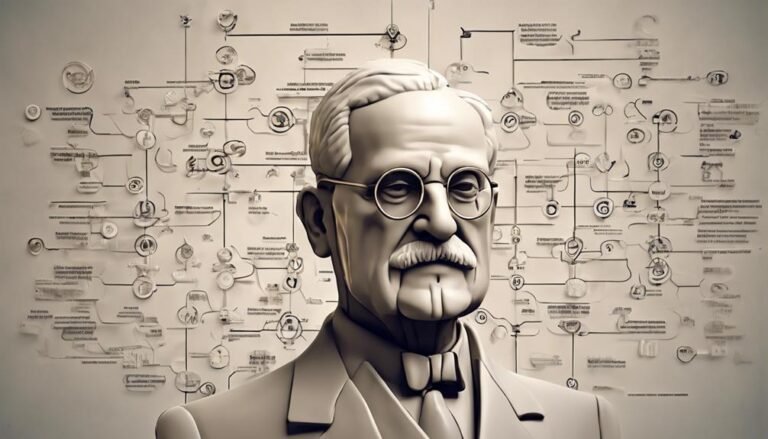Key Figures in Personality Psychology: Sigmund Freud
As you delve into the domain of personality psychology, the name Sigmund Freud is one that stands out for his groundbreaking contributions to understanding the complexities of human behavior and personality. But did you know that Freud's theories, while controversial, continue to shape modern psychological perspectives and therapeutic practices? By unraveling the intricate workings of the human mind, Freud's legacy sparks ongoing debates and reflections within the field.
Key Takeaways
- Childhood trauma influenced Freud's theories.
- Freud's psychoanalytic theory explores unconscious motives.
- Structure of mind: id, ego, superego influences behavior.
- Defense mechanisms manage internal conflicts unconsciously.
- Freud's work revolutionized psychology, shaping therapy approaches.
Early Life and Education
During his formative years, Sigmund Freud's early life and education greatly influenced his future contributions to the field of psychology. Childhood trauma played a significant role in shaping Freud's theories. Growing up in a family environment marked by financial struggles and the loss of siblings, Freud experienced firsthand the impact of early-life experiences on mental development. These personal struggles likely fueled his interest in the human mind and behavior.
In terms of academic achievements, Freud excelled in his studies, particularly in the fields of biology, physiology, and neurology. His dedication to understanding the complexities of the brain and the nervous system laid a strong foundation for his later work in psychology. Freud's academic pursuits provided him with a solid scientific background that he'd later blend with clinical observations to form his revolutionary theories on the unconscious mind and psychoanalysis.
Development of Psychoanalytic Theory
How did Sigmund Freud's exploration of the unconscious mind shape the development of his psychoanalytic theory?
Freud's thorough investigation into the unconscious mind was heavily influenced by his work with patients suffering from mental disorders. Through his clinical practice, Freud observed that many of his patients' symptoms seemed to have roots in their unconscious thoughts and experiences. This led him to develop the psychoanalytic theory, which suggests that behaviors are influenced by unconscious motives and desires.
Dream analysis played a significant role in Freud's psychoanalytic theory. He believed that dreams were a window into the unconscious mind, allowing individuals to express repressed thoughts and wishes. By interpreting dreams, Freud attempted to uncover hidden conflicts and desires that could be impacting an individual's behavior and mental well-being.
Structure of the Mind
Freud's psychoanalytic theory delineates the mind's structure into three components: the id, ego, and superego. The id operates on the pleasure principle, seeking instant gratification without concern for consequences. It consists of primitive, instinctual drives and operates at an unconscious level.
On the other hand, the ego functions on the reality principle, balancing the desires of the id with the constraints of the external world. It operates at both conscious and unconscious levels, mediating between the id and superego.
The superego develops through internalizing societal and parental values, acting as the moral compass of the mind. It operates primarily at a conscious level, aiming for perfection and moral excellence. The interplay between these three structures influences behavior and personality development.
Conscious thoughts involve awareness of one's immediate surroundings and current mental processes, while unconscious thoughts represent hidden desires, fears, and memories that influence behavior without conscious awareness. Freud's structural model of the mind provides a framework for understanding the complexities of human behavior and the conflicts that arise within the psyche.
Defense Mechanisms
The concept of defense mechanisms in psychology refers to unconscious strategies individuals employ to cope with anxiety and protect themselves from perceived threats to their psychological well-being. These mechanisms, proposed by Sigmund Freud, are key components of his psychoanalytic theory and continue to shape modern psychological understanding. Freud's legacy in this area lies in his identification and categorization of various defense mechanisms, such as repression, denial, projection, and rationalization.
These psychological mechanisms serve as protective strategies that individuals unconsciously use to manage internal conflicts and reduce feelings of distress. For example, repression involves pushing painful or unacceptable thoughts into the unconscious, while denial involves refusing to acknowledge the existence of a stressful reality.
By exploring and understanding these defense mechanisms, individuals can gain insight into their behavior, emotions, and relationships, ultimately leading to personal growth and self-awareness.
Freud's exploration of defense mechanisms has profoundly influenced the field of psychology, providing a framework for understanding how individuals navigate psychological challenges and protect their mental well-being.
Freud's Influence and Criticisms
Freud's theoretical contributions have had a lasting impact on the field of psychology, fostering both admiration and critical scrutiny. His ideas revolutionized how the human mind is comprehended, introducing concepts like the unconscious, psychosexual development, and defense mechanisms. Freud's influence can be seen in various psychological perspectives, shaping the way therapists approach treatment and researchers study personality.
However, Freud's theories haven't been without controversies. Critics argue that his work lacks empirical evidence and is too focused on sexuality. Additionally, Freud's emphasis on early childhood experiences as the foundation of personality development has been challenged by more contemporary research. Some scholars have also criticized Freud for his limited sample population and potential biases in his interpretations.
Despite these criticisms, Freud's impact on psychology remains significant. His work paved the way for future psychologists to explore the complexities of the human mind and behavior, leaving a lasting legacy in the field of personality psychology.
Conclusion
To sum up, it can be said that Sigmund Freud made a significant impact on the field of personality psychology with his pioneering work in psychoanalytic theory.
While some may view his theories as controversial or lacking in empirical evidence, Freud's contributions have unquestionably shaped the way we comprehend the complexities of human behavior and the unconscious mind.
His legacy continues to influence therapy approaches and personality research, making him a key figure in the history of psychology.







